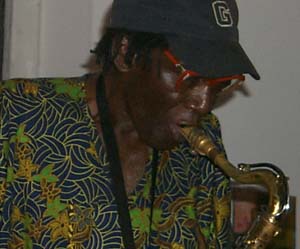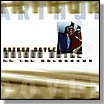
A FIRESIDE
CHAT WITH ARTHUR DOYLE
Arthur
Doyle is an underground superstar. Whether or not he ever sees the mainstream
light of day depends largely on a practically backwards in time, jazz
media, a couldn't find true artistry with two hands and a flashlight,
major labels, and a culture that seems to have turned its back on improvised
anything. So hopes here at the Weekly Roadshow are not high that we will
be seeing a Doyle bin card at Tower Records anytime soon. But there is
a beauty of a revelation called the internet and if you are so inclined
and seek avant gems, find some Doyle. I first got wind of Doyle at a Berkeley
used record store. I picked up a couple of CDs for a fiver and was blown
away. The saxophonist can blow a horn and so it was mystifying to me that
I never saw Doyle mentioned in any of the traditional and even not-so-traditional
jazz rags. That is when the Roadshow takes on the cause. We tracked down
Doyle and he sat down with the Weekly and the following is his take, unedited
and in his own words.
FRED
JUNG: Let's start from the beginning.
ARTHUR
DOYLE: At first, when I was about three or four, I saw Louis Armstrong
on TV and then Duke Ellington. I guess Louis Armstrong was my first influence.
When I was a kid, I wanted to write him and tell him to send me a trumpet
so I could play the same like him. I saw Duke Ellington on TV and he was
my major influence also. I went to high school in Birmingham, Alabama
and I first jazz record was Miles Davis' Kind of Blue and Miles Smiles
that I got through a record club. My father always bought a record on
Fridays because he listened to jazz too. I just wanted to play and sound
like John Coltrane and Sonny Rollins.
FJ:
How extensive was John Coltrane's influence earlier in your development?
ARTHUR
DOYLE: Well, I think John Coltrane is what you call one of the Messiahs.
John Coltrane played sheets of sounds. The first record I had of John
Coltrane was Blue Train, no, the first time I heard John Coltrane was
Miles Davis' Kind of Blue. I thought that was how the tenor saxophone
was supposed to sound like, him, Sonny Rollins, Wardell Gray, Coleman
Hawkins, people like that, Rahsaan Roland Kirk, people like that, Charles
Lloyd also on flute.
FJ:
Outside of Coltrane, who has been the greatest inspiration to Arthur Doyle?
ARTHUR
DOYLE: Allah has had the biggest impact on my life, God the Creator, also
Jesus and everybody else, and then my mother and father, brothers and
sisters.
FJ:
How do you approach playing the saxophone?
ARTHUR
DOYLE: Well, it is shades and softness and loudness, microtone, larger
than a whole step and smaller than a half step. Recently, I have been
trying to incorporate the European system, Fred. That is a system that
I developed. Right now, I am playing a lot with shades, loudness and softness,
microtone, larger than a whole step, smaller than a half step. That is
what I am into now. A lot of it incorporates scales and arpeggios and
stuff like that.
FJ:
Is it correct to describe your music as free jazz?
ARTHUR
DOYLE: I think so. A good description of what I am doing right now is
free jazz/soul music.
FJ:
Why do you not just play bebop or post bop in the tradition of Dexter
Gordon or Hank Mobley?
ARTHUR
DOYLE: Well, I call that like being a slave. I am free, emancipated from
that. But I also think there is room for improvement on that besides playing
bebop. Sonny Simmons, I saw that Sonny Simmons has already passed that,
he and Sonny Murray.
FJ:
Are critics promoting the idea of slavery by harping on bebop?
ARTHUR
DOYLE: I think so. I think they should be emancipated a little bit more
and give free jazz musicians a little bit more credit.
FJ:
When you get onto the bandstand, do you already have a preconceived notion
of what you will be playing or do you just let loose?
ARTHUR
DOYLE: Sometimes I do and sometimes it is a spiritual happening. Things
just come. I don't know where they come from. Sometimes I sound like John
Coltrane playing the horn, Sonny Rollins, Wayne Shorter, Joe Henderson,
and Archie Shepp, Albert Ayler.
FJ:
Can a white man play free jazz?
ARTHUR
DOYLE: (Laughing) That's debatable you know, Fred. I am trying to think
if I have heard of any that could play free jazz the way it ought to be
played (laughing). Bebop, they had a lot of them that think they could
play bebop, Gerry Mulligan, Stan Getz, Dave Brubeck, Paul Desmond, people
like that. Bill Evans, the piano player, I think he could play a lot of
bebop. I'm trying to think if I've heard of a white boy who can play free
jazz the way a black musician play it anyway. I don't know if a white
boy knows how to adlib. Like I said, Gerry Mulligan, Paul Desmond, Dave
Brubeck, Bill Evans, the piano player, Scott La Faro, they could adlib
with bebop. But that is debatavle about a white boy playing free jazz.
FJ:
Let's touch on your new release on Zugswang, A Prayer for Peace.
ARTHUR
DOYLE: I have two new albums, one with Sonny Murray. Do you have the one
with Sonny Murray? Well, two friends of mine called and said that they
wanted to do a record with me. They had nobody else to play with that
expressed themselves the way that I expressed myself on music. It is mostly
moving into the free jazz type of thing.
FJ:
And the future?
ARTHUR
DOYLE: I'm going back to Paris, France, across to England and Belgium
and maybe the Netherlands in February or March.
FJ:
You are a cult hero around here, why aren't you in Down Beat? Why don't
you have a story in Jazz Times?
ARTHUR
DOYLE: (Laughing) That is a good question, Fred. I wonder why myself why
I'm never in Down Beat. Back in the early Sixties, they used to write
about me in Down Beat. I don't know why Down Beat won't write about me.
I think, sometimes, it is to keep me down.
FJ:
Is the mainstream afraid of Arthur Doyle?
ARTHUR
DOYLE: I think so.
FJ:
What do they fear?
ARTHUR
DOYLE: Being emancipated. Being free and not slaves, slaves to the system.
FJ:
Why do you continue on knowing you will never get the appreciation in
your own country as you do in others?
ARTHUR
DOYLE: I am trying to please the gods with my music. I think if I please
the gods then my music will be happening one day, if not now, then when
I die.
FJ:
So Allah guides the music of Arthur Doyle?
ARTHUR
DOYLE: Allah guides it, Fred. Allah guides it.
Fred Jung is the Editor-In-Chief and is wondering what is the Matrix.
Email Him.

